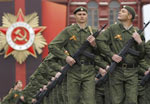Politics
Syrian tanks shell towns, at least 19 killed
Updated: 2011-05-12 11:13
(Agencies)
AMMAN - Syrian tanks shelled residential areas in two towns and at least 19 people were killed across the country, rights campaigners said, as President Bashar al-Assad's forces fought to crush a seven-week uprising.
Assad, fighting the most serious challenge to his 11-year rule, has sent troops and tanks into several cities in the last two weeks to try and end protests inspired by Arab revolts which toppled leaders in Egypt and Tunisia.
Wednesday was one of the bloodiest days apart from the main Friday protest days, when thousands use the platform of weekly Muslim prayers to demonstrate. Most of the violence occurred in the southern Deraa province, where unrest erupted on March 18.
Ammar Qurabi, head of the National Organisation for Human Rights in Syria, said 13 people were killed in the town of Harra, about 60 km (40 miles) northwest of Deraa city.
Most were killed when tanks shelled four houses. Two people - a child and a nurse - died in gunfire, he said.
Tanks also shelled a residential district in Syria's third largest city Homs and at least five people were killed, a rights campaigner in the city said. A sixth person was killed by a sniper shot to the head as he stood in front of his house.
"The security forces are terrorising urban centres," said Najati Tayara, the activist in Homs.
There was no immediate comment from Syrian authorities, who have banned most international media from Syria, making it difficult to verify accounts of events.
In Syria's second city Aleppo near the border with Turkey, security forces used batons to disperse a pro-democracy demonstration by 2,000 students on Wednesday at a university campus, a witness said.
Another resident of Aleppo said secret police had closed the main road leading from the centre of the city to the campus in the western Furqan district.
The violence has been denounced in the West, where countries have imposed limited sanctions on Syrian leaders but stopped short of calling for Assad to step down, as they have in the case of Libya's Muammar Gaddafi.
Assad adviser Bouthaina Shaaban said this week authorities had "passed the most dangerous moment" of the protest and that she had met a group of veteran opposition figures, promising them a freer press, political parties and an election law.
Assad has responded to the unrest with promises of reform, lifting a 48-year-old state of emergency. The state news agency SANA said on Wednesday a government committee had been formed to draft a new election law, but gave no details.
Activists say the reforms are cosmetic, and the crackdown on demonstrations shows Assad will not risk loosening the grip his family has held for 41 years. Rights groups say at least 650 civilians have been killed in the crackdown.
Long a foe of Washington and part of an anti-Israel bloc with Iran, Assad had nonetheless been gingerly emerging from Western isolation before the unrest.
In Banias, protesters held up pictures of Turkish Prime Minister Tayyip Erdogan to salute him for his stand against what they perceive as Assad's iron-fist policy towards opposition.
Erdogan maintains close trade and diplomatic ties with Assad but has disputed the official Damascus account of the violence.
Syrian officials have blamed most of the violence on "armed terrorist groups", backed by Islamists and foreign agitators, and say about 100 soldiers and police have been killed.
Erdogan said more than 1,000 civilians had died in Syria's upheaval.
Specials

Sino-US Dialogue
China and the US hold the third round of the Strategic and Economic Dialogue from May 9-10 in Washington.

New wave
Coastal city banks on marine sector to ride next stage of economic development

V-Day parade
A military parade marking the 66th anniversary of the Soviet victory over Nazi.